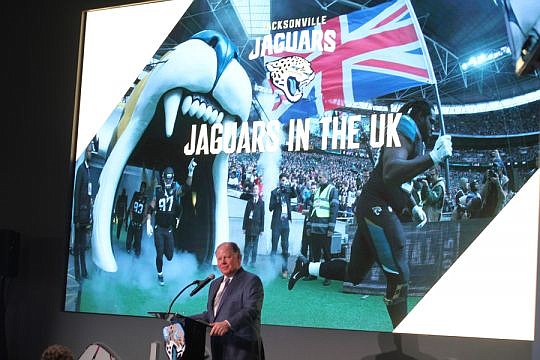
The recent opening of the Daily’s Place amphitheater and the potential redevelopment of the Jacksonville Shipyards property are two examples of Jacksonville Jaguars owner Shad Khan’s efforts to expand his team’s revenue stream.
“But the first example was London,” Jaguars President Mark Lamping said Tuesday during a luncheon talk to the World Affairs Council of Jacksonville about the Jaguars’ marketing efforts in the U.K.
Since 2013, the Jaguars have been playing one of their eight regular-season “home” games in London, which provides a big lift to the team’s finances.
“The reason we’re interested in London is maximizing our local revenue,” Lamping said. “Just maximizing Jacksonville is not going to get where we want to be.”
Local revenue is money generated by NFL teams themselves, as opposed to national revenue from sources like the league’s TV contracts.
So revenue the Jaguars take in from London games is considered local revenue.
When the Jaguars first took the field in 1995, the team ranked second in the NFL in producing local revenue, largely because of the sale of expensive club seats, Lamping said.
Most NFL stadiums didn’t have those luxury seats, so the Jaguars had an advantage and the team was very successful on and off the field in its first five years.
“It was a storybook start to the Jacksonville Jaguars,” Lamping said.
However, he said, many local businesses were motivated to commit to buying club seats and luxury boxes to help Jacksonville secure the expansion franchise from the NFL. Once the city got the team, a lot of those businesses began to cut back on ticket purchases.
“It didn’t mean people didn’t support the Jaguars,” he said, but businesses couldn’t continue to justify the expense.
As a result, the team’s local revenue had dropped to 31st out of 32 teams when Khan bought the team five years ago.
Khan began to look at other ways to generate revenue, and playing one game a year in London was part of the plan.
Lamping said the Jaguars generated about 15 percent of their local revenue from the London game, although that percentage dropped to 12 percent last year because of a less-favorable foreign exchange rate.
“Those are things that will even out over time,” he said.
The U.K. is an attractive market, not just for the Jaguars but for the entire NFL. While the NFL is the dominant sports league in the U.S., it’s looking elsewhere for new fans.
“The NFL has big growth aspirations,” Lamping said. “The growth opportunities are not necessarily here in the United States.”
Surveys show 3.1 million people in the U.K. describe themselves as avid fans of the NFL and 9.9 million are casual fans, he said.
Those fans are young, well-educated and diverse, with 40 percent between age 16 and 34, 80 percent having a university education and 35 percent female, he said.
“From a commercial standpoint, it’s really a good group to market to,” Lamping said.
“From a television standpoint, they’re in the right time zone,” he added.
Games held on Sunday afternoons in London are good for television markets because they not only reach a morning audience in the U.S, but a prime-time audience in China.
The Jaguars have marketed themselves well to London, with a U.K. fan club of 57,000 members, and the team ranks ninth among NFL teams in jersey sales there, Lamping said.
The team has started programs including a Jaguars Academy to train players and coaches in the U.K. and a “JagTag” program bringing football to school-age children.
“We’ve worked really hard to grow the Jaguars brand in London,” Lamping said.
With the help of the revenue stream from London, the Jaguars’ local revenue rank has increased into the mid-20s among NFL teams, he said.
“We’ve made some progress but we’ve got a long way to go,” he said.
The Jaguars also believe the London games are good for the city of Jacksonville, as local leaders have used the trips to recruit businesses to Northeast Florida.
“Every time the Jaguars play over there it’s treated as a trade mission,” Lamping said.
Although some people believe the Jaguars’ trips to London are a precursor to the team moving overseas, Lamping said the opposite is true and there is less chatter about the team leaving Jacksonville as revenue grows.
“People realize Shad’s commitment to Jacksonville is real,” he said.
“The result has been a more stable NFL franchise here in Jacksonville.”